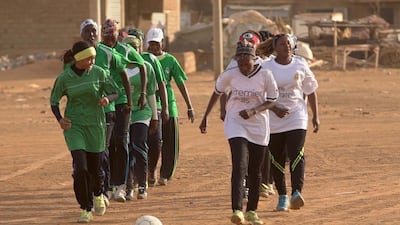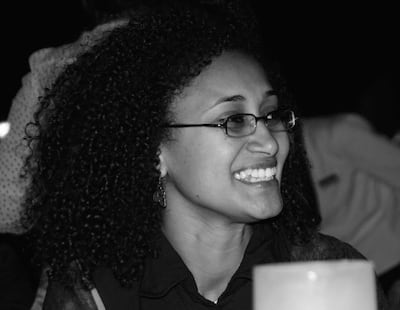Growing up, Sudan was a place of mystery for Marwa Zein. While her father is Sudanese and her mother Egyptian, the filmmaker was born in Saudi Arabia in 1985. The family moved to Egypt when she was eight. "In Cairo, I discovered cinema for the first time because there was no cinema in Saudi Arabia," recalls Zein. "I felt liberated while watching movies."
She wanted to study film, but her conservative father was against it. Refusing to be thwarted, Zein showed the sort of passion and stubbornness that would come in handy when she made Khartoum Offside. The documentary, which premiered this year, tells the story of female footballers whose dream it is to play for Sudan at a Women's World Cup hosted by their home country. "I enrolled in a chemical engineering course for three years and then I worked so hard to have some money to pay for cinema studies," she says. "I went behind my parents' back for the first year, but in the second year they found out."
The director's first visit to Sudan
At 24, Zein visited Sudan for the first time. "I'd always been trying to go, but it never worked out. Then in 2010, an Egyptian television channel was looking for someone to cover the separation of Sudan," she says, referring to the secession of South Sudan, which was formalised after a referendum in January 2011. "No one wanted to go because they were afraid the country was dangerous and disease-ridden. Although I didn't know anything about being a television correspondent, I was given the job."
Before South Sudan gained independence, Sudan was the largest country in Africa. Once bordering nine countries, it was more than a quarter of the size of the US. Sudan gained independence from the UK and Egypt in 1956 and is home to a variety of cultures, religions and ethnicities, including those of the sub-Sahara region and those from the Arab world.
Her time there was an eye-opening experience for the fledgling reporter. "It was a really tragic and extreme experience. I met amazing people who didn't believe in the separation and people who had bitter experiences of the civil war and racism."
Zein, now 33, says she felt an affinity with the country. "It allowed me to build up a realistic picture of Sudan and not the dreamy experience created by a diaspora who have never been there," she says.
Making the film
It was not long before she returned. "In October 2014, I was asked if I'd like to make a five-minute documentary about the women's football team in Sudan," she says.
Zein was immediately enamoured with the footballers, although the filmmaker says she found it difficult to try to tell their story in only five minutes. She was supposed to spend a week there, but stayed for three months before deciding to make a feature film revolving around the lives of the women.
"I felt like they could represent my inner soul in an indirect way," she says. "They are courageous and despite all the obstacles put in their way to stop them from playing football, they don't stop fighting for what they believe in and they are open-minded."
Zein says she saw an opportunity to talk about Sudan through their stories. "I felt that they could be the real, honest representatives of the modern Sudanese population. Also, they have a rebel spirit that I couldn't resist. They represent the margins of the Sudanese community and that touched me because I always felt like I'm not Saudi in Saudi Arabia, nor Egyptian in Egypt nor Sudanese in Sudan."
Khartoum Offside begins with the text: "Under the current political Islamic military rule, women are not allowed to play football in Sudan – and we are not allowed to make films – but …"
A footballer reveals that it's her dream to play in the Women's World Cup. On the surface, it's a lofty ambition. "You're right, it seems unrealistic. But for them, a way to survive is to keep dreaming," says Zein. "They are realistic, they know it's not their generation that will play, but hopefully what they are doing is opening the door for the next generation of players."
The documentary was shot over four years and was a real labour of love for Zein, but it was also difficult to make. She says she was detained twice while filming, which affected her psychologically. She also had problems with funding, while working in Sudan on and off for more than four years put a strain on her marriage.
But what is remarkable is that despite all of those difficulties, the tone of the documentary matches the humour and camaraderie displayed by the players on screen. "I wanted to keep the movie as beautiful, amusing and as informative as possible," says Zein. "I didn't want to be too direct with a lot of information. I wanted to include the women's black humour."
For Zein, Sudan is where she wants to tell stories
Despite the hardship she experienced during the project, she says she wants to make another film about Sudan. "I'm now trying to do an informative television documentary that deals with the Sudanese revolution and why it happened."
But why does the filmmaker, who currently lives in Cologne, Germany, want to continue making movies in Sudan? "I'm asking myself this question all the time," she says, laughing. "I don't know, but I see the magic in the people, they have something unique and authentic."
Khartoum Offside was given its premiere at the Berlin Film Festival in February and last month had a successful run at the Sheffield International Documentary Film Festival. "It's heartwarming showing the film. Finally, you realise that you were not crazy to make it. It was demanding, but the reaction at festivals makes it all seem worth it."
But some people have still to be convinced. "My father hasn't watched the movie yet," she says. "But my mother and my sisters are proud and happy."



